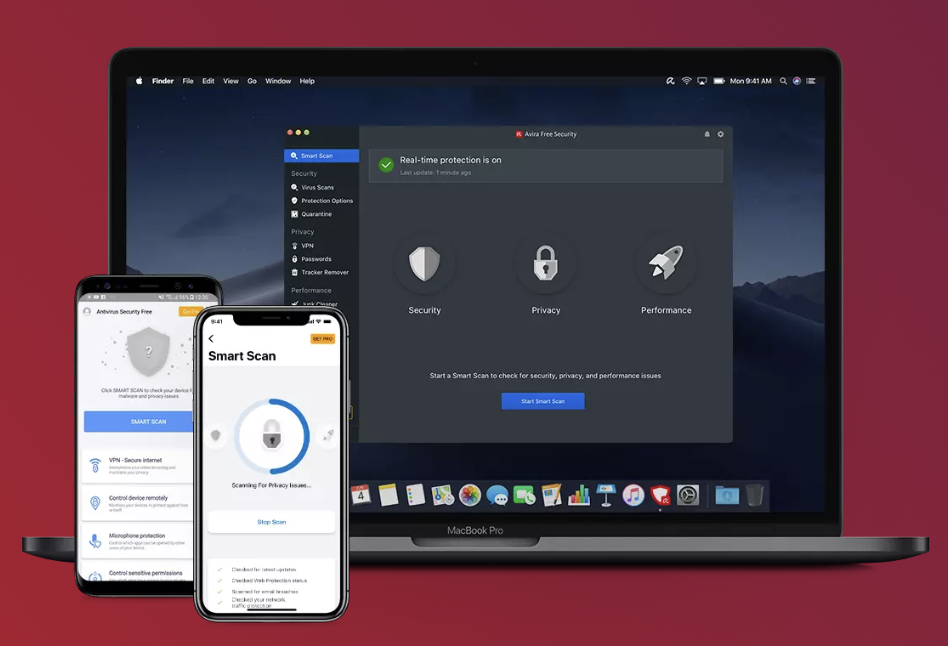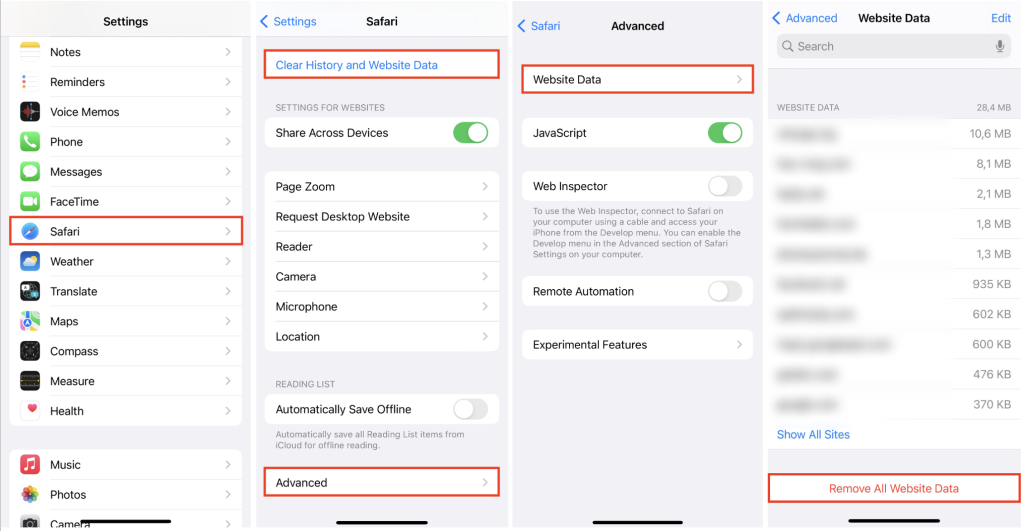From banking online to storing photos and saving log-in details for many different online platforms and services — it feels like our smartphones are an extension of ourselves.
This makes your smartphone a lucrative target for cyberattacks, with phone hacking posing a particularly serious threat. Read on to learn what the tell-tale warning signs are that your smartphone’s been hacked, how you can protect yourself from such an attack — and how you can banish hackers from your smartphone.
What is phone hacking?
Phone hacking is an umbrella term for any attempt by unauthorized persons to gain access to your phone and change how it communicates. This can range from simple but illegal eavesdropping on unsecured connections to serious security breaches. Phone hacking also includes the physical theft of your phone and brute force changes.
Any type of phone can be hacked — but as it predominantly affects smartphones and tablets, we’ll focus on them in the following.
What methods do cybercriminals use to hack smartphones?
Cybercriminals use a wide variety of methods — including forceful ones — to hack phones. To give you an idea of what hackers do, here are some common practices.
SIM swapping
SIM swapping or SIM hijacking is a fairly common method of hijacking a cell phone number. With SIM swapping, a hacker pretends to be the victim and applies to your cell phone network provider for a new SIM card, saying that their cell phone was stolen along with the SIM card, the card was lost, or the card doesn’t fit the new smartphone because it’s a different format.
When contacting your cell phone network provider’s service center, your cell phone number’s not the only thing a hacker needs to provide to verify who they purport to be — they also need to give your date of birth or home address. It’s easy to get hold of this information on social media — and with a little gentle persuasion, hackers can quickly get their hands on a new SIM card even with details they’ve simply scraped from the internet.
Once a fraudster’s activated the stolen SIM card, your own is blocked, meaning the SIM swap was successful and you can no longer use your cell phone, neither to make calls nor to text. And you won’t even be able to use your apps unless you’re connected to a Wi-Fi network.
Phishing
You’ve probably received an email from your bank warning you about a phishing threat. Phishing involves sending masses of emails or texts using a false or stolen identity, which contain a link to a fake website or a zip file.
- If you tap a link contained in the message, you are often taken to a website that looks shockingly like the legitimate one and asked to enter your log-in details there. That’s all it takes — and hey presto, the hackers have access to your sensitive data, like your online banking information, which they can then use however they want.
- Tap a zip file in a message and — you guessed it — malware typically gets unpacked, which hackers often use to wreak extensive damage.
Phishing threats lie around every corner, and it’s incredible just how quick many of us are to simply click or tap a link that we think comes from a personal contact or a trusted company. That’s why we’ve devoted an entire post to the topic of phishing where you can learn in more detail how to protect yourself.
Social engineering
Social engineering actually means social manipulation. Behind this term lies a range of methods cybercriminals use to harm their unsuspecting victims by impersonating someone else and trying to trick us into revealing sensitive information.
For example, a hacker will pretend to be a service center employee from your cell phone network provider and tell you something’s wrong with your log-in details. Or you might get a call from a supposed bank employee asking for your online banking info — far from a legitimate request.
These are just two examples of social engineering methods that you ought to know about. Check out our blogpost on social engineering to learn about the various scams out there.
Exploits
This phone hacking method is kind of like a competition between hackers. With exploits, cybercriminals aim to find security flaws in apps, bypass them, and then gain access to our smartphone data using a variety of means. Among them, they could circumvent weaknesses and inject malware into an app without you noticing it right away.
This deceitful exploitation of security flaws can become a major issue, especially with older apps and smartphones, which is why you should always install system updates as soon as you’re prompted to do so.
Unfortunately, this situation is made worse by the fact that as time goes on, developers release fewer system updates for older devices. So say you’ve got an iPhone 6, you might eventually find yourself no longer being able to update your apps — leaving you with potential security flaws.
Signs that your smartphone’s been hacked
The tell-tale signs that your smartphone might have been hacked are very varied and not always entirely clear. As such, we can only recommend one course of action: Always keep your smartphone up to date.
If you’re notified that system updates are available, these typically also include security updates that strengthen your mobile device’s defenses. You’ll also find that you’ll need to update your apps from time to time — something you should also do.
Device running slower
If websites suddenly take a surprisingly long time to load on your smartphone, apps suddenly crash while you’re using them, or you can’t send or receive messages, your phone might have been hacked.
That’s because malware that may have gotten onto your phone without your knowledge might be using your phone’s bandwidth or processing power.
Sudden loss of battery life
Apps running in the background can process huge amounts of data. However, if your smartphone’s battery suddenly drains faster than usual, you should first check whether you have opened too many apps or whether they’re active in the background.
If you close the apps and your battery life is still dire even if you also restrict background services, this can be another sign that your smartphone’s been hacked.
Hot smartphone
As is well known, a smartphone tends to get very hot when you stream videos for a long time or really give those gaming apps a good hammering. However, if your smartphone gets very hot even if you’re not using any data-hungry apps, this can be another sign that your smartphone’s been hacked.
Apps stop working
Apps that no longer work properly can also be a clear giveaway that your smartphone’s been hacked. If you find your smartphone crashes frequently while using different apps, malware could be the cause.
However, when your smartphone apps stop working properly, it can also mean that you need to update your device’s software, which plays a crucial role in smartphone security.
Unknown apps appear on your device
We all sometimes download an app that we soon forget about because we don’t actually need it.
However, if you see an app installed on your device that you have no clue about, a malicious app or website might have installed it. Given the many apps we have on our smartphones, a single potentially malicious app often goes unnoticed. So it could well be that an unknown but malicious hacker app has made it onto your smartphone.
Unexpected bills
Ever heard of the ringtone rip-off? It’s where smartphone users were duped into taking out a long-term contract when they purchased a fashionable ringtone. This was billed via the cell phone network provider and usually listed in the monthly bill as an external service.
However, if you’re hit with unexpectedly high charges that even your cell phone network provider cannot explain, your data plan may have been all used up. In this case, a hacker may have used your smartphone remotely, making calls outside of roaming zones or using premium paid services.
There are also fleeceware apps out there that can sometimes charge very high subscription fees. These apps lure you in with a free trial that turns into a paid subscription a few days later. If you find such apps on your smartphone, cancel the subscription in the app because simply removing the app itself won’t be enough.
Increase in nuisance texts and calls
It’s highly unlikely that your smartphone will be hacked by a hacker calling you. With a text message, however, things are completely different — that’s because you’re far more likely to tap a link sent in a text message. If you receive masses of texts and are being bombarded by spam, it’s a sure sign of phone hacking.
Also, if someone tells you that you called them or sent a weird text and it turns out you didn’t, your smartphone may have been hacked.
Follow these steps to protect your smartphone from phone hacking attacks
Luckily, there are a number of steps you can take to proactively protect yourself from phone hacking attacks.
Most importantly, never leave your smartphone unattended (apart from when at home), but you’re probably careful not to do that anyway.
Install system and app updates to strengthen security
It doesn’t matter if you’re an Android or iOS user, it’s extremely important that you install the latest system updates. That’s because these updates not only improve performance but also always fix recently discovered security flaws. So if you get prompted to install a system update, do it as soon as possible.
The apps you use might also contain security flaws that the developers discovered themselves and fixed as part of an update to prevent exploits. So, be sure to also update your apps as soon as the app or your device tells you that an update is available.
Improve your protection against phone hacking with antivirus software
Tried-and-tested antivirus protection isn’t just a must-have on your Windows laptop, PC, or Mac — your smartphone needs it too. With virus protection installed, it’ll continuously scan your smartphone and alert you if it finds something during a scan and discovers malware on your smartphone.
If, for instance, you use Avira Free Antivirus for Android on your Android smartphone or tablet, you improve your protection against a virus or malware attack and reduce the potential impacts of phone hacking. In the Google Play Store, Avira Free Antivirus is called Avira Security Antivirus & VPN — an immediate giveaway that this app does much more than provide antivirus protection.
If you’re an iPhone or iPad user, you can use Avira Free Antivirus for iOS.

Top tip: Schedule regular scans for Avira Free Antivirus to run. Note: This feature is not available for iOS (in our example we use a Samsung Galaxy S20 running Android 12).
- To do this, open the app and tap Profile at the bottom of the screen.
- Under Settings, tap Smart scan to configure the scanning options.
- Customize the risk categories and which scanning options you want to include as part of regular scans.
- Toggle Scan Scheduler to on. Choose the day(s) of the week and the time you want the scan(s) to run.

Use complex and strong passwords to make it more difficult for an attacker to hack your smartphone
You’re probably already well aware, but you should protect your smartphone with a password or code to make it difficult for attackers to hack your phone and gain access to your data.
If you use a password manager on your smartphone, you only need to remember a single master password. Such a tool, like Avira Password Manager can help you generate unique, strong passwords and log you in to your accounts without the hassle of having to enter your credentials — let alone remember them in the first place.
Similar to online banking, Avira offers additional security measures such as two-factor authentication (2FA), which can help prevent your master password from falling into the wrong hands. And with the touch & face ID feature also included in Avira Password Manager, you can access passwords on your phone with just your thumb or via your phone’s facial recognition software.

Clear your browser cache
Regularly clearing your browser cache can help improve your protection against phone hacking — and as an added benefit, improve your smartphone or tablet’s performance.
The term “cache” has its roots in the French language, meaning something like “a hidden store of things”. These items, like images, are cached in the browser so they can be displayed more quickly when you visit a web page containing those images again. You should also check your browser history and cookies regularly and, if vast amounts are building up, delete them to improve your protection against phone hacking. That’s because all traces of your browser history can quickly be used to identify trends in your life that make you an attractive victim to hackers.
Here’s how to clear your iPhone’s browser cache
In our example we use an iPhone XR with iOS 15.3.1:
- Open the Settings app and swipe up until you see Safari.
- If you want to delete all website data and clear the history, simply tap Clear History and Website Data.
- If you don’t want to delete the history, tap Advanced right at the bottom.
- Then, under Website Data, select Remove All Website Data, then tap Remove Now. Your history will be kept, but the cache will be emptied.

Here’s how to delete your Android phone or tablet’s browser cache
In our example we use a Samsung Galaxy S20 running Android 12 and using the Samsung Internet Browser:
- First go to the Settings menu.
- Then select Personal browsing data under Privacy.
- If you now tap Delete browsing data, you can customize which data you want to have deleted.
- Empty the preselected data types (as in our example) by tapping Delete data.

Browser protection can complement your phone hacking prevention measures
A browser protection extension or add-on is also a great tool to boost your protection against phone hacking attacks.
If you use the free Avira Browser Safety add-on, you can avoid phishing attempts, harmful websites, and browser hijacking attempts. This then lessens the damage caused by some of the phone hacking methods used by cybercriminals.

VPNs can help protect you from phone hacking
On the train, traveling, or in a café: We like to use our smartphones beyond the home using public Wi-Fi hotspots because it preserves our precious mobile data allowance and sometimes offers a better connection.
However, because public Wi-Fi networks are often not particularly well secured, using a VPN (virtual private network) is a good way to better protect your online privacy on your smartphone or tablet.
A VPN connection encrypts your internet data traffic, protecting it from the prying eyes of unauthorized third parties — it also offers a host of other benefits such as helping to prevent your online activities from being tracked.
When choosing a VPN solution that’s right for you and your needs, make sure you go for a reputable provider. Paid VPN offerings or the free versions of what are called freemium VPNs are always a good choice.
Avira Phantom VPN, for instance, is one such reputable VPN. You can choose between a VPN for Android or a VPN for iPhone based on your mobile device. Even with the freeware version, you can manage your online activities on your smartphone and strengthen the protection of your online privacy thanks to its monthly data volume of 500 MB.

What should you do if your phone’s been hacked?
If you’ve actually fallen victim to a phone hacking attack, you need to act. Despite being hacked, there are a number of measures you can take to get your smartphone back.
Delete suspicious apps
Apps you didn’t download yourself might have been smuggled onto your smartphone by cybercriminals or hackers. That’s why you should check your installed apps carefully — but don’t remove them straight away.
If you’re unsure whether some apps are scams, use a search engine to find out. If you use an Android device, for example, this operating system comes loaded with a whole range of apps. Sometimes, though, these ensure your smartphone functions properly and should therefore not be deleted. Just use a search engine to find out which ones you should keep and which ones you can remove
Scan your smartphone with tried-and-tested antivirus software
We’ve mentioned that a tried-and-tested antivirus solution is a must-have even for your smartphone — like Avira Free Antivirus which is available for both Android and iOS devices.
To prevent a malware infestation on your smartphone from going undetected for a long time, you should schedule regular scans with the scheduling feature (we described how to do this above).
If you’re an Android user, you can also use the Avira Free Antivirus app to tune up your device. After each scan, simply tap Performance at the bottom and then select Optimizer. This built-in optimizer software helps you clean up your device’s storage and memory, improving your smartphone’s performance.
Restore your smartphone
If you factory reset your smartphone, you should be able to get rid of all the damage caused by a phone hack. We recommend you back up all your contacts, pictures, and messages before restoring your device.
Change your passwords regularly
Once you’ve cleaned your smartphone of viruses and malware, tuned it up, and then reset it to its factory settings, you should change all the different passwords you have for your accounts. These can include your Google account, your online banking and your email accounts (personal and business), your phone PIN, and of course all your professional and personal social media accounts.
It’s the perfect time to think about using a password manager. One of these tools — like Avira Password Manager — can make life a whole lot easier for you by generating unique and more secure passwords.














